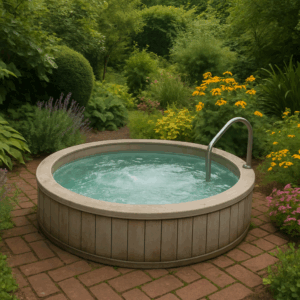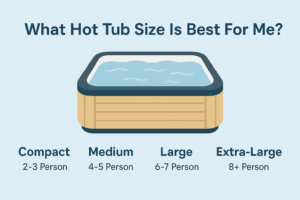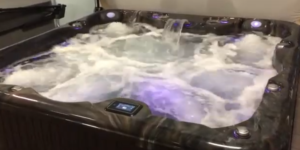When it comes to choosing a hot tub, one of the key decisions you'll face is whether to opt for a salt water hot tub with a saltwater system or the more traditional chlorine system. Both have their advantages and disadvantages, and understanding these can help you make an informed choice that suits your lifestyle and preferences. In this article, we'll delve into the pros and cons of saltwater hot tubs, comparing them to their chlorine counterparts to help you decide which is the best fit for your needs.
Saltwater hot tubs use a salt chlorine generator to produce chlorine from salt. This system automatically converts a small amount of added salt into chlorine, maintaining the water's cleanliness and keeping it safe for use. Unlike traditional hot tubs that require manual addition of chlorine, saltwater hot tubs provide a more automated solution.
The Pros of Saltwater Hot Tubs
Softer on Your Skin
One of the most appealing benefits of saltwater hot tubs is the feel of the water. The salt present in the water makes it feel softer and less drying on the skin compared to traditional chlorine-treated water. This can be particularly beneficial for individuals with sensitive skin or those prone to dryness.
Lower Chlorine Levels
Saltwater systems maintain lower chlorine levels than conventional hot tubs. While chlorine is still present, its concentration is reduced, resulting in less harsh chemical exposure. This means less risk of irritation to the eyes and skin, making for a more pleasant soaking experience.
Reduced Maintenance
Saltwater hot tubs generally require less maintenance than their chlorine counterparts. The automatic chlorine generation reduces the need for frequent chemical testing and adjustments. This can save time and effort for hot tub owners, allowing for more relaxation and less work.
Eco-Friendly Option
Saltwater hot tubs are considered more environmentally friendly. The reduced need for chemical additives means fewer chemicals are released into the environment. Additionally, salt is a natural resource, and the overall ecological footprint of operating a saltwater hot tub is smaller.
The Cons of Saltwater Hot Tubs
Initial Cost
The initial setup cost of a saltwater hot tub can be higher than that of a traditional chlorine hot tub. The salt chlorine generator and the necessary installation can contribute to this increased upfront expense. However, these costs may be offset over time by the reduced need for chemical purchases.
Corrosion Risk
Salt is corrosive, and over time, it can cause damage to certain components of the hot tub. Metal parts, heaters, and other fixtures can be susceptible to corrosion if not properly maintained. Regular inspections and maintenance are essential to mitigate this risk and ensure the longevity of your hot tub.
Limited Availability
Saltwater hot tubs may not be as widely available as traditional chlorine models, and finding a local supplier or technician familiar with these systems can sometimes be challenging. This can make installation and repairs more complicated and potentially more expensive.
Potential for Scaling
Saltwater systems can lead to scaling, a buildup of minerals on the surfaces of the hot tub. This can be managed with regular cleaning and the use of scale inhibitors, but it adds an additional maintenance task for hot tub owners.
Comparing Saltwater and Chlorine Hot Tubs
Water Quality
Both saltwater and chlorine hot tubs effectively maintain water quality, but they achieve this in different ways. Saltwater systems offer a gentler approach with less noticeable chlorine odors, while traditional chlorine hot tubs provide a straightforward, tried-and-true method.
Maintenance Requirements
Saltwater hot tubs generally require less frequent maintenance due to the automated chlorine production. However, they do need periodic attention to ensure the salt levels and generator are functioning correctly. Chlorine hot tubs, on the other hand, require regular testing and manual addition of chemicals.
Cost Over Time
While the initial cost of saltwater hot tubs is higher, they can be more cost-effective in the long run due to reduced chemical purchases. Chlorine hot tubs have a lower upfront cost but may incur higher ongoing expenses for chemical supplies.
Environmental Impact
by Krystal Black (https://unsplash.com/@krystalblackphoto)
Saltwater hot tubs are considered more environmentally friendly due to their lower chemical usage. This can be an important consideration for eco-conscious consumers looking to minimize their environmental footprint.
Comfort and Experience
The softer, less irritating water of saltwater hot tubs often provides a more comfortable soaking experience, especially for those with sensitive skin. Chlorine hot tubs may have a stronger chemical odor and can sometimes cause skin and eye irritation.
Common Problems with Saltwater Hot Tubs
Corrosion
Corrosion is one of the most significant challenges associated with saltwater hot tubs. Regular maintenance and the use of corrosion-resistant materials can help mitigate this issue, but it requires ongoing attention.
Generator Malfunctions
The salt chlorine generator is a crucial component of the saltwater system, and any malfunction can lead to issues with water quality. Routine checks and timely repairs are necessary to keep the system running smoothly.
Scaling
As mentioned earlier, scaling can be a problem in saltwater hot tubs. Preventive measures, such as using a scale inhibitor and regular cleaning, are essential to avoid buildup and maintain the hot tub's appearance and functionality.
Conclusion: Are Saltwater Hot Tubs Better Than Chlorine?
The decision between a saltwater hot tub and a chlorine hot tub ultimately depends on your personal preferences and priorities. Saltwater hot tubs offer a more natural, low-maintenance solution with benefits for sensitive skin and the environment. However, they come with higher initial costs and potential challenges like corrosion and scaling.
Chlorine hot tubs, while requiring more hands-on maintenance, provide a reliable and widely available option with lower upfront costs. Consider your budget, maintenance preferences, and any skin sensitivities when making your choice.
Ultimately, both options can provide a relaxing and enjoyable hot tub experience, so choose the one that best aligns with your lifestyle and needs.












